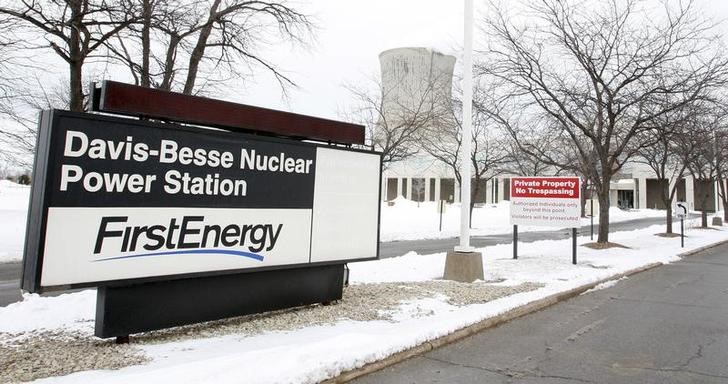By Scott DiSavino and Valerie Volcovici
NEW YORK/WASHINGTON (Reuters) - U.S. power company FirstEnergy Corp (N:FE) urged the federal government on Thursday to evoke little-used emergency powers to help it keep several struggling nuclear and coal-fired power plants open, a move critics blasted as an attempt at a corporate bailout.
On Wednesday, Ohio-based FirstEnergy said it would shut several nuclear plants in Ohio and Pennsylvania in the next three years without some kind of state or federal relief.
FirstEnergy's FirstEnergy Solutions unit called on U.S. Energy Secretary Rick Perry to use the emergency powers to order PJM Interconnection, the regional power grid operator, to negotiate a contract that would compensate owners of coal and nuclear plants for the benefits such as reliability and jobs those units provide.
PJM, in response, rejected the need for an emergency order. "Nothing we have seen suggests there is any kind of emergency from these units retiring," said Vincent Duane, senior vice president at PJM, calling the problem "fundamentally a corporate issue."
A spokesman for FirstEnergy Solutions declined to comment on Thursday about speculation the unit was headed for bankruptcy, but he directed attention to a filing the company made with the Energy Department earlier in the day. The filing included a comment made by FirstEnergy Corp's chief executive, Charles Jones, in February that he would be "shocked" if FirstEnergy Solutions did not file for some type of bankruptcy protection by the end of March.
Coal and nuclear power plant operators have struggled in recent years as low natural gas prices as a result of the shale boom have spurred utilities to retire dirtier coal plants. Last year, Perry proposed a plan that would subsidize coal and nuclear for providing what is known as base-load generation, which refers to units that run around the clock.
U.S. regulators rejected that proposal in January and said they would conduct a study on grid resilience. Many grid operators, including PJM, have said they already factor in reliability of their systems and the fuel resources available to generate electricity.
Murray Energy Corp, which supplies coal to FirstEnergy and has been lobbying elected officials to keep coal and nuclear plants operating, said it fully supports the request for emergency relief.
"As a result of FERC’s failure, critical power plants will close, thousands of American jobs will be lost, and the reliability, resiliency, and security of our electric power grids will be forever compromised," Murray Energy said in a statement, referring to the Federal Energy Regulatory Commission's rejection of Perry's resiliency proposal.
FirstEnergy said in November 2016 that it would exit the competitive generation business overseen by FirstEnergy Solutions as natural gas has taken up a greater part of the power load.
On Wednesday, FirstEnergy Solutions said it told PJM it would retire all of its nuclear reactors in Ohio and Pennsylvania, totaling 4,048 megawatts (MW), in 2020 and 2021.
One megawatt is enough power for 1,000 U.S. homes.
FirstEnergy said it wants an emergency order because the power grid's reliability is threatened, due to the "premature retirement of plants that have many years of useful life but cannot operate profitably under current market conditions."
PJM said, however, that FirstEnergy's assets "have been financially stressed for some time."
The Energy Department said it received FirstEnergy's request and will go through its standard review process. It did not comment further. PJM said such a request, if granted, would effectively circumvent FERC, putting it in "uncharted waters."
Shares in FirstEnergy closed down 1.1 percent to $34.01 on Thursday.
The use of emergency orders related to power generation has been minimal, having been evoked only eight times since December 2000, according to the Energy Department, usually in response to natural disasters or blackouts.
Groups that rarely agree on anything condemned FirstEnergy's request.
The American Petroleum Institute (API), a trade group for the oil and natural gas industry, said, "FirstEnergy's claim that the electric grid would be in immediate danger with these power plant retirements is simply untrue.
"PJM is responsible for the reliability of the grid and if there is an emergency, PJM already has the tools to respond," API said in a statement
The environmental group the Sierra Club said it would sue if Perry issues any order to bail out FirstEnergy.
"Ratepayers and regulators have already rejected multiple attempts by (FirstEnergy) to bail out these coal and nuclear plants that can no longer compete in the marketplace," Mary Anne Hitt, director of the Sierra Club's Beyond Coal campaign, said in a statement.
Other companies have sought assistance from federal, state and regional officials to keep their coal and nuclear plants in service, and some states, including New York and Illinois, have offered subsidies to nuclear plants.
These companies argue that the diversification of fuel sources is necessary to keep the power grid operating in the most optimal way. More coal plants are expected to be decommissioned in coming years, and natural gas recently surpassed coal as the biggest source of power generation in the United States.

Most states are also putting rules in place to boost generation through renewable sources.